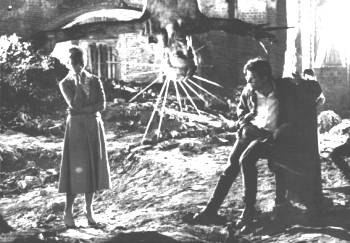 | ||||||||||
Popiol i diament [Ashes and Diamonds]
 fot: Renata Pajchel |
The last day of the war.
The morning of the first day of peace. That special night and the fate of a young man caught up in the past, tired of heroism, sensing a different, better life. What a beautiful subject for a film. On that special night the past and present meet and sit down at one table. To the rhythm of tangos and foxtrots Maciek Chelmicki searches for an answer: how to live, how to rid himself of the suffocating burden of the past. He solves the eternal dilemma of the soldier: to obey or to think? But nevertheless Maciek kills...
He would rather kill a man, even against his own will, than give up his arms. He is typical of his generation: he depends only on himself and on a well concealed gun, reliable and accurate. I love these uncompromising young men and I understand them. I want my modest film to reveal to the cinema audience the complicated and difficult reality of my generation".
Andrzej Wajda
Reviews
A film has appeared which is probably the most complete artistic work based on recent history since The Wedding. It is rare indeed, and not only in film, for an for a young artist like Andrzej Wajda, at the start of his creative life, almost at its inception, to undertake a work which may well be the most outstanding work in his life. (...) The fight on the other side is also confined to two characters: Szczuka and the secretary of the regional Party committee. There have been voices raised in criticism, focusing on the fact that the communists in this film are unable to muster the strength neccssary to be an equal opponent in the conflict; the dramatic weakness of Szczuka weakens even Maciek's plight which, after all, was brought on by the victory of the communists in Poland. Such accusations seem to be misguided. By building Szczuka up, making him into a more dynamic, active character Wajda would overshadow Maciek's drama. Maciek is the hero of the film, the subject of a conflict whose object is Szczuka.
Aleksander Jackiewicz
"Trybuna Ludu", Warsaw , 25 October 1958
Ashes and Diamonds, the best film to date produced in Poland, is at the same time the most Polish of films, reflecting our national fortunes. (...)
The artistic merits of the film seem to be beyond doubt. More controversial are the problems raised by the film and its political resonance, especially for the ΘmigrΘ circles. I can hardly share these doubts. The accusations expressed in Poland by Wiktor Woroszylski that in Ashes and Diamonds the AK (Home Army) veterans have been deprived of a convincing rationale seem false to me. In my opinion, in 1945, after the collapse of their leaders' ideas, an objective rationale simply did not exist. Officially, even the AK did not exist at that time, so the moral aspect of assassination and the value of partisan activity in a hopeless political situation can be easily questioned. (...)
Every unprejudiced viewer must admit that Wajda's film displays maximum of understanding and human sympathy for both sides, or rather for the people on both sides inspired by honest motives. This compassion has caused a number of English critics to view Ashes and Diamonds as a psychological drama of individuals, and not a film about "political murder" as the English subtitle of the film states.
Boleslaw Taborski
"Kontynenty Nowy Merkuriusz", London, July 1959
The real dimension of Ashes and Diamonds is eschatological; when all is said, the true passion in this film is not the passion for detailed historical recreation, but the passion of a moralizer with regard to elemental issues: life, death, beauty, love, and the nightmare of murder. Even if Wajda's intentions were different, his talent took the upper hand, and critics should always remain faithful to talent. There is a scene in Ashes and Diamonds where two people, the murderer and his victim, approach one another and fall into one another's arms, as if seeking salvation from a third party - destiny. This scene actually sums up the whole film in an ellipsis which brings to mind not Wyspianski or Styka, but rather Aeschylus and Shakespeare.
Stanislaw Grochowiak
"Ekran", Warsaw, 19 October 1955
In sketching a portrait of his hero, Wajda avoided both conformism and exaggeration. He hasn't made him either into a monster or a degenerate, or even a ne'er-do-well, but simply a youth deformed by war. This is in keeping with the same honesty and attention to verisimilitude, which characterizes the presentation of the political and social climate in Poland at the moment of the allied victory. Advocates of the new and the old systems confront one another not as symbolic marionettes, but as people made of real flcsh and blood, hungering for a shred of hope. Furthermore, the film is beautiful in itself: well constructed, well played, and well narrated. Wajda can only be accused of occasionally falling into unnecessary aestheticism. As in earlier Kanal, some simply thrilling shots are juxtaposed to others which seem to be overly sophisticated. The bluntness of the subject demanded formal rigours which the director did not always have the courage to respect. But this is only a detail. Wajda will quickly overcome his noisy elation. At 32 years of age he has proven that he is a thoroughbred creative artist and ertainly one of the most talented creators of the European "new wave".
Jean de Baroncelli
"Le Monde", Paris, 11 November 1959
This film is available at the Merlin bookstore
Jerzy Andrzejewski's book Popiol i diament is available at the Merlin bookstore
This film is also available at the www.amazon.com (with English subtitles)
Oscar | Films | Theatre | Why Japan?
Favourites | Pictures gallery | About Wajda | Bibliography
Main Page | Search | Wersja polska
Copyright © 2000 Proszynski i S-ka SA. All rights reserved